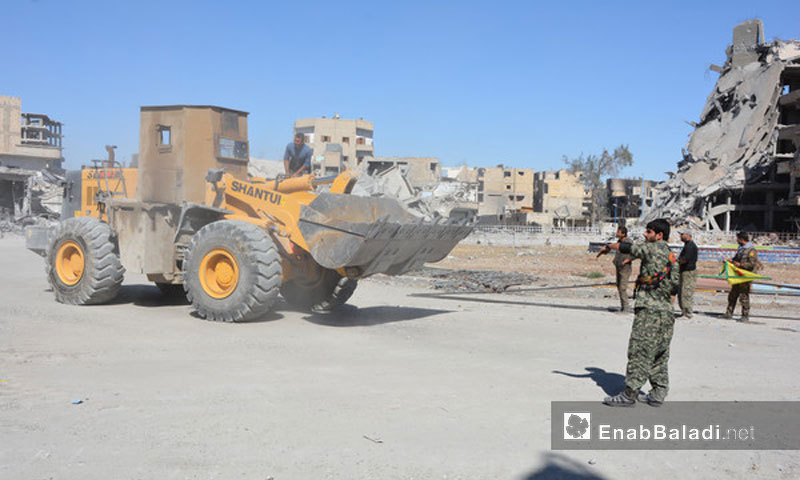



A mixture of excavations, asphalt, piles of rubble, shattered “Islamic State” (IS) signboards and the Kurdish “People Protection Unites'” scattered flags, as well as rusty damaged cables, the remnants of the city’s electricity network, ironically, survived to accompany you through your journey in the roads of Raqqa’s western countryside.
The people in the area say that the green spaces, which once consisted of trees and various crops, has now shrunk to the half. Acknowledging the disaster, they complain of silence, a forced one, preventing them from demanding better living conditions, especially a few months after the expulsion of IS.
For more than three decades, Abu Mousaed, 52 years old, worked in agriculture. The high prices of seeds and oil forced him to keep away from his profession. Accordingly, he sold part of his land and started working as a taxi driver transporting passengers between the villages of Raqqa’s countryside.
“Here, everything needs repair from roads, to sanitary installations and clean water lines,” he told Enab Baladi.
The man does not deny that the situation is “slightly” improved, considering the freedom of movement it allows. Nevertheless, he points out to the procedures undertaken by the “Syrian Democratic Forces” (SDF) through the intermediary of Raqqa’s Civil Council. “They ask for our official papers, certificates, and the car license. All these have been either lost or damaged in the shelling.”
The returns Abu Mousaed gets from the taxi do not even cover the costs of repairing the damage befalling it due to the roads or high prices of fuel. He estimates that “the price of a single litter of fuel is 500 Syrian pounds,” and it is likely to go higher for winter is coming. The high prices wave “is about to hit everything in that countryside, which once was described as the land of good,” he said.
The price of a single gas cylinder is 9,000 Syrian pounds and heating oil’s price is about to reach 300 Syrian pounds per litter. Because of this, people started to fear that they might need to totally give up electricity generators “due to their high costs and the high prices of the ampere generators,” according to the people interviewed by Enab Baladi.
The streets of al-Mansoura Village, to the west of Raqqa, are almost vacant at night. Abu Athab, a young man in his twenties, tells Enab Baladi that the village’s condition is “semi-normal”.
However, many of the village’s people who left it did not yet return. “The people are still afraid of SDF and do not trust their management of the city. Especially that the charge of affiliation to ISIS is ready, after which the person disappears in their prisons.”
Al-Mansoura was one of IS’ prominent centers in the past a few years. Nonetheless, the village exhibits shallow traces, phrases spreading here and there on its walls.
To Enab Baladi, Um Mahmoud, a 72 years old shop owner, says that she did not notice a change or any work done by the municipality. She demands “more and better services”.
This woman complains of the “slow reforms” which the “Self-management” has promised accusing its members of participating in “plundering steel, sewage pipes, water stations and official establishment’s furniture, all these have been stolen and the matter continues unchanged.”
Al-Mansoura Municipality admits the shortage of services, according to a volunteer who refused to reveal his name. He pointed out to Enab Baladi that the local administration is working to improve the reality of services, “but that takes some time.”
The offices and committees of the administration succeeded in delivering water to a large part of the village, in addition to cleaning rounds and periodical inspection of shops, according to the volunteer, who referred to the current work which aims to regulate construction processes, price and goods control. He attributed the delay in providing the basic services to “damaged water pumps and the cables and signboards which are being stolen by IS’ mercenaries.”
However, Um Mahmoud says that most of the villages’ neighborhoods are still without water, as is the case in large areas of al-Mansour’s countryside, pointing to the spread of random landfills.
“Years have passed and nothing is changing; nothing is improving. A tyrant goes and another comes. The only thing that is changing is the color of the painting on the walls and the writing on them,” she said with her local accent.
In Mid-July, SDF established municipalities in the area. The one in al-Mansoura was called “People’s Municipality” and since then it started studying and implementing service projects in Raqqa’s countryside, according to what she said.
The area’s people, who Enab Baladi interviewed, said that the projects “remained on the papers and media platform without a way to implement them.”
They insisted on the fact that they are suffering and that they are waiting for something to alleviate their pains in the coming days.
if you think the article contain wrong information or you have additional details Send Correction